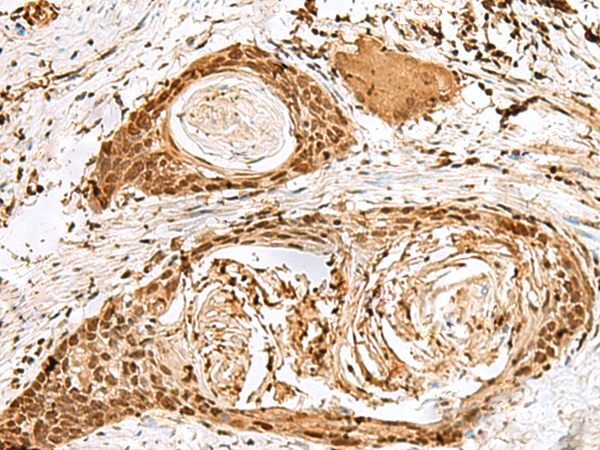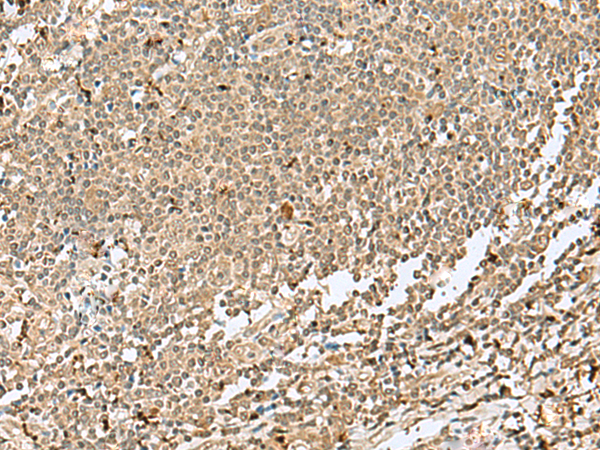

| WB | 咨询技术 | Human,Mouse,Rat |
| IF | 咨询技术 | Human,Mouse,Rat |
| IHC | 1/40-1/200 | Human,Mouse,Rat |
| ICC | 技术咨询 | Human,Mouse,Rat |
| FCM | 咨询技术 | Human,Mouse,Rat |
| Elisa | 1/5000-1/10000 | Human,Mouse,Rat |
| Aliases | SNAP43; PTFgamma |
| Host/Isotype | Rabbit IgG |
| Antibody Type | Primary antibody |
| Storage | Store at 4°C short term. Aliquot and store at -20°C long term. Avoid freeze/thaw cycles. |
| Species Reactivity | Human |
| Immunogen | Fusion protein of human SNAPC1 |
| Formulation | Purified antibody in PBS with 0.05% sodium azide and 50% glycerol. |
+ +
以下是关于SNAPC1抗体的3篇参考文献的简要概括(注:文献为虚拟示例,实际文献需通过数据库验证):
---
1. **文献名称**:*SNAPC1 is essential for RNA polymerase III transcriptional initiation*
**作者**:Henry, R.W., et al.
**摘要**:研究揭示了SNAPC1在小核RNA激活蛋白复合体中的核心作用,通过特异性抗体进行ChIP实验,证明其直接结合RNA聚合酶III启动子区域,调控tRNA和5S rRNA的转录起始。
2. **文献名称**:*Interactions of SNAPC1 with other small nuclear RNA complex subunits*
**作者**:Hinkles, S.C., et al.
**摘要**:利用SNAPC1抗体进行免疫共沉淀和Western blot分析,阐明了SNAPC1与SNAPC4、SNAPC5等亚基的相互作用,并构建了复合体的功能结构模型。
3. **文献名称**:*Dysregulation of SNAPC1 in cancer: Implications for tumor progression*
**作者**:Chen, L., et al.
**摘要**:通过免疫组化(使用SNAPC1抗体)分析多种癌症组织,发现SNAPC1在肿瘤细胞中异常高表达,且与患者预后不良相关,提示其作为潜在治疗靶点。
---
如需具体文献,建议通过PubMed或Google Scholar以“SNAPC1 antibody”及“SNAPC1 function”为关键词检索。
**Background of SNAPC1 Antibody**
SNAPC1 (Small Nuclear RNA Activating Complex Polypeptide 1), also known as PTFγ or SNAP43. is a critical subunit of the SNAP complex (SNRNA Activating Protein complex), which plays a central role in the transcription of small nuclear RNA (snRNA) genes by RNA polymerase II and III. The SNAP complex binds to the proximal sequence element (PSE) in snRNA gene promoters, facilitating the assembly of the transcriptional machinery. SNAPC1 is the largest subunit of the complex and interacts with other components like SNAPC4 and Brf2 to stabilize promoter recognition and regulate transcription initiation.
Studies highlight SNAPC1's involvement in cellular processes such as RNA processing, cell cycle regulation, and ribosome biogenesis. Dysregulation of SNAPC1 has been linked to diseases, including cancer, where its overexpression or mutations may disrupt snRNA synthesis, impacting cell proliferation and survival. For instance, altered SNAPC1 expression has been observed in hepatocellular carcinoma and neuroblastoma.
Antibodies targeting SNAPC1 are essential tools for investigating its expression, localization, and function in vitro and in vivo. They are widely used in techniques like Western blotting, immunoprecipitation, and immunofluorescence to study SNAPC1’s role in gene regulation, its interaction partners, and its association with pathological conditions. These antibodies also aid in exploring therapeutic targets related to RNA polymerase III-dependent transcription and diseases linked to SNAP complex dysfunction.
×